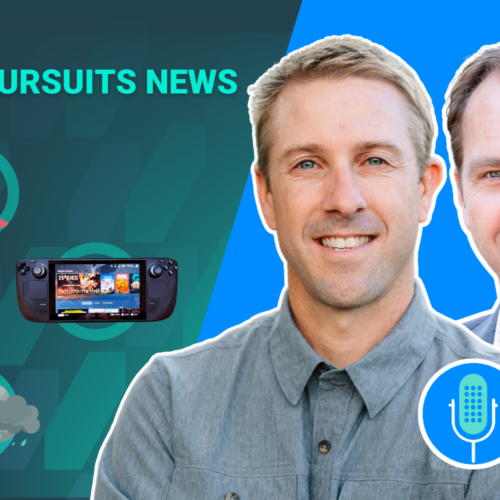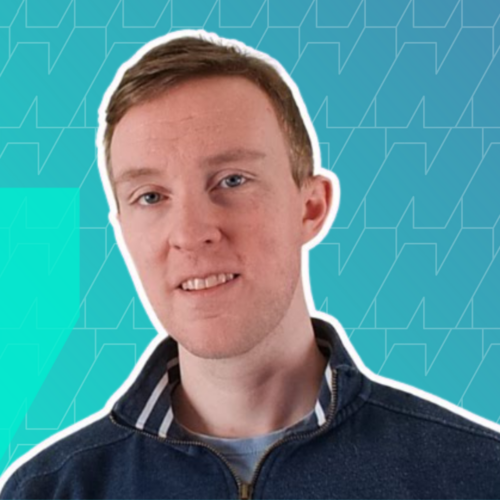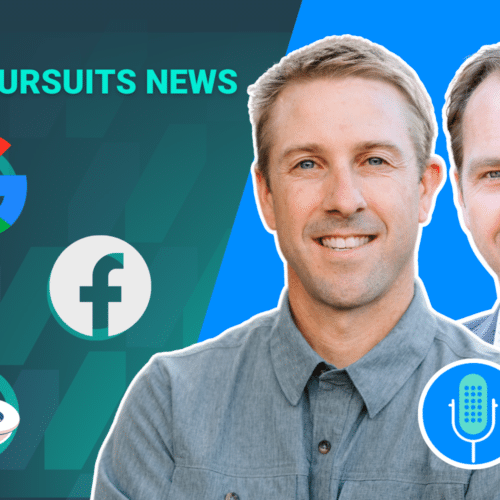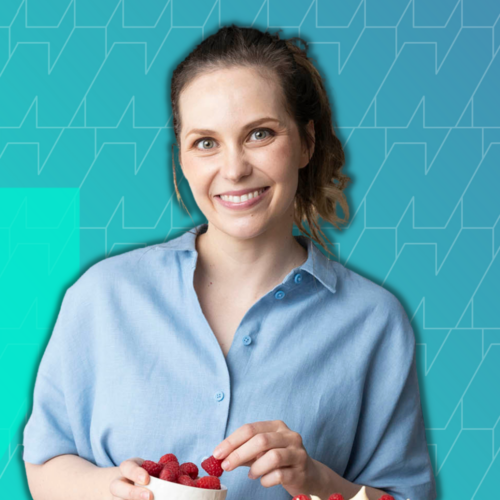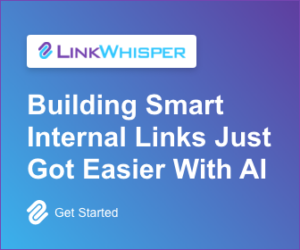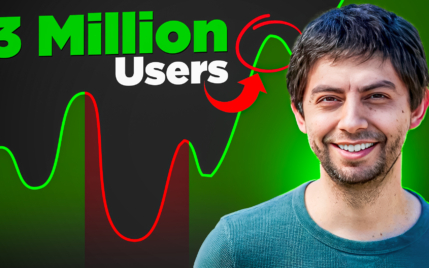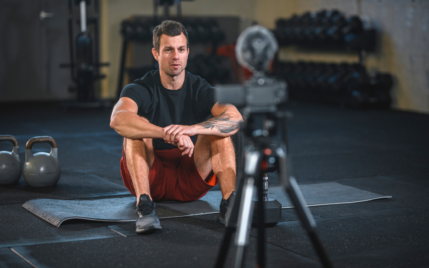How Emily Dyson Went From 80% Pinterest Traffic Loss to Massive SEO Win in Just 1 Year
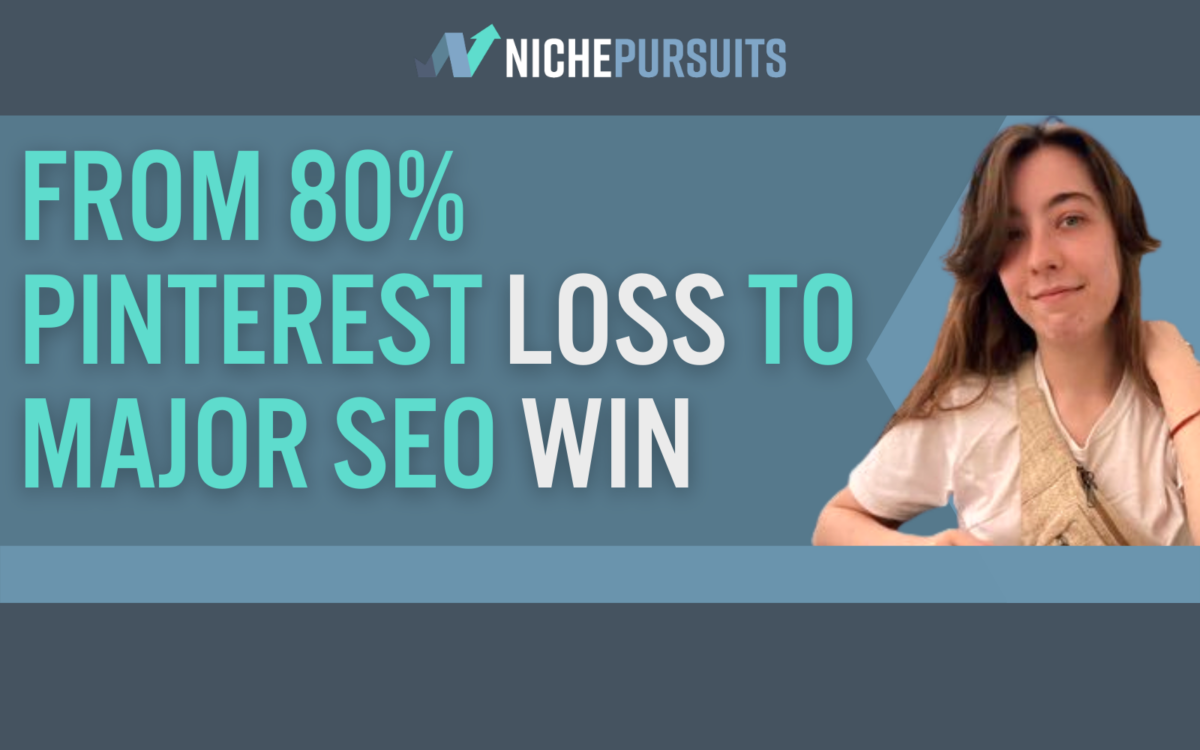
When you buy something through one of the links on our site, we may earn an affiliate commission.
Today on the Niche Pursuits podcast, we have Emily Dyson. Emily has been building websites for a few years now, and this conversation has a primary focus on her most popular website which she started in 2018. Her site received between 4-5k visitors per day, most of which came from Pinterest.
However, this success was short-lived when her website numbers nose-dived to around an 80% loss after a Pinterest algorithm update in 2021. The site went from 4-5 thousand visitors daily to less than a thousand within a couple of months.
After trying (and struggling with) different measures to fix things, Emily decided to learn SEO, which she had never really paid attention to previously on her blog.
She shares the process she went through for learning SEO and the strategies she has used to rank in Google and get her website traffic numbers back up and thriving.
Emily talks about her previous articles and what she did to improve them. She highlights the type of content she uses today and why they seem to perform better in the search engines.
In addition to this, Emily talks about keyword research, topical authority, and how AI plays a significant role in her content approach.
Some of the other things discussed during the chat include:
- The importance of patience when learning new skills
- Her views on Pinterest
- Changing the style of her content
- Doubling down on a topic that’s doing well
- Creating valuable content consistently with a regular publishing schedule
- Tactics to help with burnout
- Staying focused on one niche topic
- Analyzing the competition
- Why you shouldn’t be too down with negative analytics
- How she uses AI to create content
- Her goal for Google clicks by December 2022
- Finding writers for her website
Emily’s story is inspiring, as well as enjoyable — she started a blog without any SEO and figured out what was needed to get the site back to receiving thousands of daily visitors from organic search — in less than 12 months!
She shares advice that will hit home for those just starting, those using Pinterest, and anyone else struggling to come to terms with SEO.
As always, take notes and enjoy.
LINKS AND RESOURCES MENTIONED IN THE PODCAST:
- Emily Dyson Twitter Account — @TheEmilyDyson
- Jasper AI (Formerly Jasper)
- Mediavine
- Emily’s Newsletter
This Episode is Sponsored by: The Blog Millionaire
Watch the full interview:
Read the full transcription:
Jared: My name is Jared Bauman. Today. We are joined by Emily Dyson, Emily Welcome.
Emily: Hello, thank you for having me.
Jared: Yeah. Cheers. Thanks for being here. It's going to be a great day and a great interview. And I mean, today we're talking really niche sites and building niche websites. You have a really cool case study going that I know we're going to dive into and a fun backstory actually.
So maybe let's start there. Can you bring us up to speed on your journey into the website building world and your journey into SEO?
Emily: Yeah, my, my story is. I'd say quite unique because I haven't always been growing my website with, with SEO. So I started with my website about, Hmm, probably about in 2018. I started my first website.
The reason I got started was because I saw that a lot of people were driving traffic to their website using Pinterest. And I fought well, you know, I felt at the time and that's really interesting. I, I might as well give that try. Yeah. I had nothing to lose. I, all I had to lose was time and I just feel like, let me go for it.
So I started that. I started trying to drive some traffic to my website. I'm using Pinterest pretty quickly I saw a success with that. And then that, that. A couple of years. And then unfortunately last year interests decided. That they're going to change a few things on the platform, which meant that my traffic went down for all.
Probably I was getting around 4,000 to 5,000 sessions a day, and that went down to less than a thousand sessions a day. It was, it was a free. Rapid decline.
Jared: Was that in, was it in like, was it like overnight, it just went or was it something where with the way their algorithm updated, it kind of just trickled down to that.
Emily: Yeah, it was more of a trickle down and I tried my best, you know, to, to change my approach, change everything. I was doing my tactics away, my pins. Look the way I was posting and they didn't help, nothing helped. ‘
Jared: cause. I mean, I know it's a Google update, you know, in search, like you'll be here one day and then bam, it's kind of an instantaneous thing.
And I've heard so many stories about just Pinterest, not performing, like it used to. Is that something that you, I mean, did you have other site owners that you were in community with that had the same challenges? Do you know of anyone that's really overcoming.
Emily: I don't know anyone who's ever comment, but I was at the time when I started to see that the client, I was like, oh, you know, is this something that's just happening to me?
Is this something that's happened to other people? So I got on some Facebook groups, you know, did some digging and it seemed like. It was happening to pretty much everybody at the time so that, you know, that wasn't great. It meant that, you know, a big part of my income went with the decline in traffic, but it also opened up the whole world of SEO.
So it worked out, I guess.
Jared: So you had no real previous SEO experience prior to this drop-off flash.
Emily: The drop-off happened, probably. I want to say it began in March last year, around that time. And in January last year, I started learning a little bit about SEO. So when the drop happened, Was, you know, how it was, I was learning a little bit about SEO, but I was still, I was still a beginner
Jared: and it was still a lot to learn there.
I bet
Emily: I was very confused and the so many different technical terms, it was quite overwhelming. So. Well at the time when the drop was happening, that I wasn't really getting any traffic from Google. So I didn't really have that pro.
Jared: And so this was less than a year ago that the Pinterest drop kind of started to happen.
I feel like that lines up with what so many people have talked about. I have a website as well. That was. Doing okay. You know, are right on Pinterest and it's it. Hasn't, it's kind of, I don't know if it's been as dramatic as your website, but it certainly has lost like at least half of its Pinterest traffic over the last year or two.
Luckily it also gets SEO traffic. So it doesn't hurt as much, but it, I mean, it's kind of, it's really hard to know what to do with about it.
Emily: Yeah, it definitely
Jared: is. So when you started transitioning to SEO, what did that look like? I mean, you have this, I guess at this point, we're now roughly in March of last year and your traffic again, I wrote it down four or 5,000 pages a day down to less than a thousand.
So that's, you know, over 80% of your traffic is gone. Yeah. I mean, walk us through what happens after that.
Emily: Well, I have to make a decision that was either keep learning about SEO and keep sticking with what I was doing in regards to SEO, or just give up. And I didn't know, I didn't want to just give up. So I stuck with land and ball SEO.
I watched so many YouTube videos and I read so many blog posts. And along the way, I just learned like little bits of information and I started implementing them with Pinterest. I was posting recipe style content, and it was very listicle based. So there wasn't really any substance to it. There was no information that there was no value really being provided within my articles.
So I had to switch all of that off. And then I transitioned from writing about recipes. Mr court format to write long form articles about any firm from light lifestyle content, to wellness, to a, you know, any pretty much. And it was very scattered my approach until I, until I wrote one article about manifestation and that brought in quite a lot of traffic for me.
And that's when I realized, okay, I need to double down on this topic. I need to write more about this stuff. Which is then brought me into the current state of my website, which I'm now focusing on spirituality as a whole. And I intend to stick with that. But even that little bit of knowledge of doubling down on a topic that's doing well.
I learned that just from watching YouTube with the know topical authority. So that's where I learned that little trick.
Jared: So I have just a whole number of questions for how you did that transition, because I think that's impressive to teach yourself SEO while experiencing a site drop off of precipitous forms.
And I just, I think there's gonna be a lot of value for everybody listening, who might have a very Pinterest heavy site, and that hasn't figured out how to transition that site to, to kind of more of an SEO site. Before we maybe go into some of that. Tell us, so tell us where things are today. So people can kind of get a framework for where things were maybe a year ago, what drop off happened, but now how things are today with your traffic and maybe your earnings or wherever you're comfortable.
Emily: Yeah. So my traffic from Google is steadily go and book yesterday. I actually experienced my new all time high clicks. Yes. Thank you very much. We got you on a good day. Yeah, I've got it written down. And that was about 1,791 clicks from Google. So to put that into perspective one year ago, exactly. I was getting 150.
Clicks from Google. So yeah, it's quite an increase and I'm doing my best publishing. Certainly me working on the site. It's a lot of work now. I hope to eventually get on the writer. Okay. A couple of writers on board to help me write, just do them, try my best to do one article a day. Right now. It's quite, it's quite hard, but
Jared: that's a grind.
It's a grind after a while.
Emily: Yeah. Well, I, you know, I've come to realize that the more value, valuable, informative, well put together articles that you post the quicker you're going to grow and, you know, on Google. And I always stress to my audience that you need to find the post and schedule. It works for you because I can do one article a day, but you know, some people don't have enough time.
And to make sure that you're consistent with everything and make sure that you build the momentum, you need to find the posting schedule that works for you. Well, that's one article a week or one article a day, you know, just pick, find something that works for you and stick with it. I'm a big believer in just in just sticking with one thing for a long time.
Jared: Have you been pretty consistent with your publishing schedule? I guess almost a year now that you've transitioned from a Pinterest focus site to an SEO focus site.
Emily: Yeah. Yeah. So when I started the transition, I was maybe publishing maybe like 10 articles a month. And then, you know, it was a lot of work and it was, I guess I slow, I slowly warmed up to the idea of posting more and getting into the whole routine of it.
And I, I spoke to quite a lot of people that said to me straight, you know, you need to publish one to two articles a day. You just need to keep. So I, I stuck with it. I've got some numbers written down. Like last year I posted 205.
Jared: It was all yourself. That's really good. That's all. Yeah. Call yourself cranking out the content.
Did you, I mean, do you feel like you're, I guess for lack of a better term, like, are you burning out or are you, is that you talked about having a schedule that works for you? Is that schedule something that you've found is. Balance. So you don't burn out, but that you still push yourself to publish a lot of, or are you kind of ran up against yourself there with,
Emily: I think I'm able to do pray sustainably without burning out too much.
I do think it's important to take a couple of days out. Like last month was December, so it was Christmas and I wanted to take a couple of days out there. And spend time with family. So I didn't mind it didn't match the whole a day thing there, but when I feel myself better, now I will try to do something like to destruct my mind, to step away from the computer for a bit and just breathe.
But yeah, I would say overall, I've done pretty well with sticking to it and not getting too bent out.
Jared: So let me ask about the revenue of the site. Compared to when it was at its peak on Pinterest compared to now, it sounds like, I mean, I'm just guessing, like most Pinterest type sites are monetized with an ad network of sorts and, and driving a display ad rather.
Where was the site monetized before compared to now. And is the revenue catching up to where this,
Emily: well, I monetize with display ads. Like you say, I'm with media Vaughn. I know it's, I'll be honest and say the endings. Aren't what they were this time last year, then not at that point. And I think that was because I was just driving so much traffic.
With Pinterest that, although I'm driving a lot of traffic now with Google, it hasn't caught up to where it was. So I'm just, now I'm not making as much, but I'm having fun with it. And it's all I know that it will get there. Eventually. I know that it will recover. I just need to just keep our head.
Jared: Good, good.
Aye. Okay. Let's talk about maybe some of the tactical things you did. What did you think are the most important things you did to this site to start this SEO traffic that you now have? I mean, you talked about the number of articles you published. Did you delete new, old articles? Did you update those articles and add to it?
You talked about how you used to be recipe focused. Now your spirituality focused on, I'm just really curious, kind of the main things you did to this site that you think led to its successful transit.
Emily: Yeah. Yeah. I would say my whole approach to SEO is very basic. One of the biggest things that I think is it contributes to my success.
Is sticking with one niche. You know, I'm not flip-flopping between different niches is that whole building, building topical authority or something I'm really big into. And I don't do anything with backlinks. I know a lot of. I ran into that. I haven't really gotten my head around that. If I'm honest, I filled in 10 links.
So, you know, people can, people who will come to one of my articles can hopefully click through to her. And the other one of my articles, which I'm, you know, results in loss sessions, hopefully, but definitely the topical authority is definitely a big one. I see so many bloggers struggling to, to generate traffic.
From Google. And I look at their content, their contents, gray, what their I, and, you know, it's all good. The website's laid out in a great way, but the one thing that the old doin is flip-flopping between niches. Like there'll be riot in one week about finance. Then the next week there'll be writing about beauty and it's like, they're not giving themselves a chance to build topical authority.
They're just going all over the place. And I think that really doesn't help. Like one of my methods is let's say your website or your blog is about skincare, right? A batch of articles about an area of skincare, like let's say moisturizes, right? Right. Faye articles, let's say on moisturizer. And then move on to a new area of skincare.
You might write about cleanses, right? And have a fight, fair your articles about cleanses. Once you've done that, you can move on to another area of skin care, right. Fe articles on toners, you know, and then once you've done that, you can then analyze your traffic and you might start to see puns. You might start to see, oh wow.
All the articles I've written on cleanses have all done really well. But the ones I've written on moisturizers, they haven't done so well. So then that, that tells you, okay, I need to write more. About, so you didn't need to write more about you not trying to say,
Jared: yeah, I do. I do. I'm chuckling because it, you make it sound so simple.
Sorry. No, it's good. I think sometimes that's exactly what it is though, because people do over complicated.
Emily: It's just seeing patterns try and different things, but try different things within your own niche. You don't have to go all over the place. Pick one thing and do it.
Jared: How is it? You mentioned 30. Do you think 30 is the right number to write, to try to, I guess, give it a good shot, right?
Because you don't want. Only a couple articles maybe because you wouldn't actually be giving Google enough to give you a shot at that silo or that topical authority cluster. How many artists is 30 kind of the baseline or is that something that you're writing 30 articles? Because you're pretty confident that this niche will work and you really just want to try to tackle all the big topics right out of the gate.
Emily: I would say fail close is a minimum, but what people should do is analyze the competition. You know, if you've got some big sites that you'll compete in against the name of God, again, going back to the skincare example, if they've got a hundred dollar KOLs on moisturizes and they've done that really well, and you only write five in not going gonna, you're not going to get there.
You need to be looking at what your competition have done and why they're ranking the. And I think if you figure out how many articles that they've published on, it's on the topic. If you can match the upbeat, that'll get gap around the amount of articles you, you might have about a shot, then there's just right in the homeschool.
I think there's a, I can't remember the exact sec terms. You can go on Google. And I think if you write, I think it's site and then like the two, like colon things, your competition, and then maybe space and all in title and then a keyword. It will show you how many. Posts or articles that website has written on that keyword.
I can't remember the exact name of what that's called, but that's something that I do, but yeah, that's something I do.
Jared: Wow. And so you're able to kind of see like, oh, they, you know, in this topic and this topical cluster, or this site has written 80 articles. You're even 30, you're only going to just be skimming the surface here, but maybe if they've written eight or 10, you know, that was 15 or 20 or something you might be able to beat about.
Emily: Yeah. Yeah, definitely. That's something that I will do. And it gives me a good idea of some topics are a huge competition for hundreds of articles. And it's like, you just think, oh, you know, I'm never going to beat them. And if that's the case and if it's only, you. Working on the site. It might be better to just pick another topic.
You could be there for years and by the time you've caught up, they're already way ahead of, yeah,
Jared: because they're still publishing content while you're trying to catch up. Yeah, exactly. How else do you analyze competition? I mean, you talked about that, the site search or using any tools. Are there any other manual methods you're using to kind of research what's working?
What's not with your competition?
Emily: Really good question. Because I feel like I do so many things automatically. I don't even think about what I'm doing that just do
Jared: it. It's like, it's my job to try to draw those things out. And you're like, I thought about the fact that I do that. Yeah.
Emily: I think that is probably the biggest thing that I do.
Competition. I'll also read the articles. See if there's anything that I think I can write an about a way or any extra points that I could put forward in my article. It's about the same topic. It see if it's written in a straightforward way, a lot of websites are their content is. It's it's, it's just full of jargon of technical terms that nobody knows about apart from if you're an expert.
So what I tried to do is see if they've made things begin to friendly and wrote it in a straightforward way. If what they've written makes sense. I think that that's a big thing is right. And things in a way that's, that's just easy to understand it. It easy to read. If a beginner came to the article, they would know exactly what you were talking about.
Like you don't have to have any fluffy to ask, to have any jargon, just be straight about,
Jared: are you an expert in your niche in terms of what you write? Would you consider it something that you have a passionate about? Or is it maybe a previous profession or are you just kind of learning about the niche as you go?
I mean, you talk about what'd you say, I think over 200 articles you wrote and the depth of the content, how much of an expert are you in the actual space that your website is?
Emily: Well, I wouldn't say I'm an expert, so I learn as I go, you know, if there's a new topic within my niche that I want to go and conquer, I'll try my best to learn about it.
So I know that what I'm writing about. Is going to be the best information that I can give, but now I sat and it wasn't, I wouldn't say that I'm an expert. I have always been interested in my niche with this even topics I've recently been writing about within my niche that I didn't really know. I'm just laying.
And I said,
Jared: well, the reason I even asked the questions, I heard you talking about not writing articles with a lot of the jargon and with a lot of the technical terms, you know, you could make a case that you are almost writing articles, obviously with the needed information and the depth of information. That almost your position on the topic isn't to be the local expert, but really to be the one who's sharing the valuable information that maybe beginner or somebody who's more on the curious side of things would be interested in that.
That's kinda why I was asking.
Emily: Yeah. Yeah, definitely. I think the fact that I'm learning as I go helps a lot because I'm writing. For people like myself I'm right in full beginners. Yeah. I definitely think it helps.
Jared: So you mentioned a ways back in, in the conversation, a lot of what you saw, a lot of what you used to be doing that was working well on Pinterest was kind of these listicle style recipes.
Thin content, I think you said, or it wasn't really in depth. So did you just get rid of all those or did you go back and update them? What did you do with all this old content that did well on Pinterest, but clearly isn't aligned with what you're, where you're going right now. I completely
Emily: left it where it was just, yeah, just left it there.
And I think eventually I will go back and probably delete a lot. You know, once the aunt and any traffic or, you know, it just not good, just not good content. I'll probably go ahead and delete eventually. But right now they're just sitting there. There's still. And all of the listicle glory, they're still in.
And
Jared: some people would say that you should delete all that content because maybe it's getting in the way of Google understanding what your website is about or it's clouding, you know, their crawl and their understanding of your content. Clearly though, your website is growing quite well in Google. About the topics that you're writing about now.
So I'm curious what you would, how you would feel about that or what you would say to that. Obviously what you're doing is working. And I'm just curious, because I know a lot of people would ask right away in the comments here, like, Hey, why wouldn't you want to just go delete all of it right away to help with that topical authority that you referenced earlier.
Emily: Yeah. And you know, I've had the belt, people doing that, you know, you clear out old content on their website. It doesn't align with what they're doing anymore. Like I say, I might get there eventually. I'm sure I will get there eventually to delete all the old content, but right now, like it's gotten like, you know, they still got a couple of clicks from Pinterest, so I might as well just leave it there.
It's bringing them a little bit of traffic earnings. Yeah. Yeah, exactly. So I guess I could end up deleting them and my traffic from Google goes up even more. It's just not something I've really prioritized right now.
Jared: Yeah. Fair enough. You said you're a one, one person operation. So managing your time is critical, which is a good segue.
So I follow you on Twitter. And for those of you who don't follow Emily on Twitter, you definitely. She shares a ton of valuable insights. You've just started a newsletter too, which we'll get to in a little bit, I think, what are you maybe two or three in, at this recording? I feel like, or maybe I've read two or three, but I'm also great.
Also great stuff on Twitter. And your Twitter handle is the Emily Dyson at the Emily Dyson. You were talking about how you're using AI. For some of your content and I would be really intrigued to hear about it and I'll set the stage for anytime we talk, AI, it's fun. But typically the people that you hear talking about using AI in their content are people that have been doing SEO for a long time.
And that's not to stereotype. It just seems that way. Because AI is kind of seems overwhelming to try to figure out how to make it make sense. Here you are a beginner SEO using AI in your content. I mean, I'd just love to hear more about what your process is and how you're utilizing. Yeah.
Emily: Yeah. So I'm a big belief and AI helps, you know, it's simple, it makes things simple.
It makes things easy. It can help when you've got right as block it's right there. You know, it knows what to say, and it knows how to make things engaging, which sometimes can be difficult. But what I don't believe is relying on it completely, you know, you can't just, well, I wasn't personally allow the AI to write the whole article.
And, you know, just keep clicking for it to write a new sentence. I wouldn't just do that. And then just publish the whole thing. I'm more use it as I use it alongside myself, I will outline the article myself and I will maybe write a sentence or two. To get started and then let the AI do the rest and guide it where I can.
My process is pretty simple. Really. I have a YouTube video somewhere showing people because I got a lot of questions at Twitter about using that. And it's like, I don't know. I just see things, see the world and simple to hymns, but the way I use it is so simple. And I feel like if, if people saw me using that, they would maybe be a bit shocked.
The health center. It really?
Jared: I mean, w it sounds like the outline is really important though. Like if you don't have that outline set up ahead of time, then your process might not be quite so simple. It might break.
Emily: Yeah. So I will have the outline as in the headers and the title, the subheadings. I will put them together myself by looking what my competition is row.
And, you know, I think Betson where I did my own points. I did my own ideas and I'll use that as like, you know, like I say, the outline of, I know what I need to talk about. And then, like I say, oh, write one sentence about like, I don't know, I just left the AI, do it, do the rest until it kinda starts to go a bit off the rails,
Jared: or that was going to be my next question.
Like, do you have a certain amount of words you're trying to get out of it or you just kinda let it go until it starts getting a little weird and then you're kind of rein it back a bit and move on to the next header. Maybe add your own transition sentence.
Emily: Yeah. Yeah, exactly. Like that. That's exactly how I work.
Like I say, I wouldn't just let the AI do the whole thing. You've got, you have got a sort of arena in or put in your bits of valuable and your expertise into it, but in your facts, if you need to put in facts, don't just let the AI do all of it.
Jared: What are tool are you using? I use Jasper. Okay. Yeah, it is, man.
It's just, I feel like we could do episodes upon episodes. Just talking about AI as a tool for content producers. Have you noticed any difference at all in articles in terms of traffic that you've gotten. AI versus non AI, maybe articles you've written all yourself versus articles, mainly written by AI.
Like, is it performing almost just as well, guests? It is considering you're continuing to use it and you pay attention to what's working, but is there any difference in terms of how fast it ranks or how well it does, how much traffic
it
Emily: gets? No, I, I haven't noticed any difference and I think it is because I'm pretty strict in the way that I use it and I don't just lay it.
Right. The whole thing, you know, it's all about. Use it, I use it as a tool, as a guide. And I said, don't just rely on that a hundred percent. You've got to add your own human influences of the whole process. But now I haven't noticed any difference with how quick articles rank or anything like that.
Jared: Now, how long are your articles typically?
Do you have a length you try to try to go for, especially with the use of AI. Are you producing some pretty long form content or still keeping some of your articles for like.
Emily: I'll be honest. And in the beginning guy, I was all about reaching a with count and I've, I've doing more or just as many words as my competitors.
I w I was really into that. And then I saw it straight off that path. Now I really don't pay attention to what count. What's all. I will just write. It'll allow the AI to write whatever I feel is necessary. I feel like, okay, now I've done that pretty well. And that's it. Right. I don't really look at the word count.
I don't try to reach a specific word count, like. Right. Whatever I think is best.
Jared: Yup. Yup. Now, in terms of monetization, you mentioned that you're on media vine and that's, you know, display ads are your primary form of earnings. Are, is there any affiliate play on this? Is there any goal of having, you know, affiliate style content going
Emily: forward?
A couple of affiliate ALC articles, but you know, they're just like Amazon affiliate. They don't really, they don't really generate. Amazing amount of money, like probably less than a hundred dollars a month. So, you know, it's not anything substantial, but I would be open to learn more about affiliate marketing, you know, where I could, if there's anyone out there that could, they could help me with that, just reach out on suicide.
I would really like to get my website newsletter started for my site, the shit. At some point, I've got to learn a little bit more about that because I know that there's some people who are really making like a good amount from the newsletter. On their blogs on their website. It's not something I really I'm eager to learn more about.
Jared: Yeah, your traffic. I mean, you know, 2000 visitors a day and growing, I mean, you could probably generate a decent sized email list over the course of time.
Emily: I'm just trying to figure out how to do it. You know, again, if anyone wants to help me, I see your
Jared: strategy here. This is a good strategy. I like your strategy.
So let's, let's maybe let's take a step back. Cause I, again, I, I just think that you perhaps embodies so many listeners who maybe feel, and I don't wanna put words in your mouth, but I'm just trying to maybe, you know, kind of make this bigger statement about where you are. Our one year into this SEO game and it's working.
And I think a lot of people can see anonymize a fat. They can feel stuck, they can feel overwhelmed. They can not take action as a result of that. And you know, you're a shining example of taking action. We've talked a lot about. We've talked about how backlinks aren't something you're focusing on right now.
Something that you know is still a little bit kinda, you gotta, you gotta put some effort towards that. If you want to start doing that. What about the technical side of SEO? Now you had the website beforehand, so you clearly, you know, you knew plenty about operating a website. Have you been overwhelmed at all by some of the technical sides of SEO?
And if you have, how have you overcome that? What have you learned with the technical side of SEO?
Emily: Yeah. I really don't know a whole lot about it. If I'm totally honest, you know, I know I'm about structuring your website and making sure everything's running smoothly and like things that low than quick.
I know about that, but this is a whole, it's like a whole nother world that I haven't even dived into yet. I try my best to make everything on my website. Look as user friendly as possible. You know, I try not to. Allow pages to get like two to bulk down too slow. I don't, you know, it's play yet. It's something I really don't know a lot about.
I'll be honest.
Jared: It's just it's so, I mean, I think you're kind of underselling it a bit, but it's very easy to, you're calling it a very simple approach, but I think the simplicity is that you see. To do a great job about not getting distracted, you know, what's important. And you know, for you, it's publishing high quality content with consistency and staying, sticking to it.
And within a year you have some great results and I'm sure I'm going to go ahead and say I'm sure any, anybody who didn't know much about SEO. To have the results you have in your later would be very happy with that. And perhaps a lot of people, especially in the beginning, feel like they need to know everything before they get going and then get distracted along the way, thinking that, okay, it's now my time to figure out how to do backlinks.
It's now my time to try to figure out how to, you know, become a technical SEO expert. And I mean, so it it's really. I think it's very empowering for people who are listening to maybe not get overwhelmed by all the details to actually take action, to focus on what matters the most and just continually do it with consistency.
Emily: Definitely. You know, there's something that I like to describe as shiny object syndrome. You're doing something. And then you see someone else and then, you know, whatever it is, they're making all this money out. Again, all these clicks, the website and selling all these products. So you abandon what you're doing and move on to that.
And then you're doing that for a while. Then you see the next thing the net is. So Alice is doing something and you want to do that. And although it's great, you know, want to try different things and figure out what works for you and what you enjoy. You need to stick with something long enough. And something that really helps me is I've got this mindset where I know that I will succeed.
I don't know when I just know that I will eventually. Cause if I keep putting all this effort in and keep learning and keep being consistent, eventually it will pay off. But there's days when, like even a couple of days ago, my traffic from Google had gone down. And I was just like, you know, what's the point in all this?
It's I'm wasting my time here, right? If I've put all the oldest work and I'm not, my child is going open on now, it's going down. And then today rolls around and I've got even more clicks than I was getting. It's you've got to take a step back and look at the bigger picture all because one day your clicks or your income or whatever it may be is down.
That doesn't represent your whole journey. Like, like I would take a step back one day when things go down, that's, that's normal by as perfectly normal, your clicks are going to go down one day where you should start to worry is when it's month after month after month Fisco and down one day, you really don't need to worry.
Like, remember why you stopped. Like what motivates your white? Why are you doing this? You know, some people are set start that journey because they want to help give their family about life. You know, remember why you started whatever that is, whatever the reason is.
Jared: Great tip. That's a great tip. Maybe people, maybe we all shouldn't pay attention to our analytics quite so closely on a day-by-day basis.
The what's the future. Hold what's up next for this site, you know, you published over 200 articles last year. What is a we're recording right now at the beginning of 2022. What does the next year look like?
Emily: Well, I hope I hope to do about 300 articles this year. I hope, like I say, get that email list, that newsletter, so.
Because I know how important and how valuable that can be as an asset to your business. And it's another income source. Hopefully, maybe, you know, hire a writer when my income's there. I can maybe hire a writer and just keep high, really just keep doing what I'm doing. Then I hope that by the end of this year, I I'm hoping predicted, you know, if my numbers arrive that for December 20, 22, We'll hopefully have 170, 170 files and can that's right under a 70,000 clicks for the soundbite 20, 22.
That's my goal. That's why one. And hopefully if I know to keep it, and who knows,
Jared: if you get the typical RPM bump that happens for most sites in Q4 and you get your site up to 170,000 clicks or sessions, or however you want to value. For the month of December, that would be a very profitable.
Emily: Yeah. Yeah.
I don't I've I've worked out the numbers and hopefully I can get the, if I don't, you know, oh, well, I'll get there eventually.
Jared: When do you, I'm just curious. What's the criteria for you to start having a writer come join you and write some of the articles. What are you waiting for? Is there a certain person you're looking for?
The haven't found yet? Is there a certain budget you want to, or amount of money you want to make every month before you start paying someone to write, how are you choosing to jump into having another writer in your.
Emily: Yeah, I think it's a combination of finding the right person having the, you know, the right budget.
I think now I could maybe hire a writer, but you know, I'll be honest and say, I haven't like sat down and done the proper songs. I haven't done the proper numbers of, okay. Can I afford this? Because if I'm hiring someone, I hope that it would be long term, but yeah, it's hard to find people to talk, to find the right person out there.
Jared: Yeah. It's it's tricky to know when to do it and then to go find the right person, especially if you're looking for someone that's fairly niche specific, you know, or really has that expertise in your niche then adds another layer of complication on top.
Emily: Yeah, definitely. Definitely. I did a look not too long ago and I didn't really find anyone that, you know, the.
Pique my interest. Yeah.
Jared: That peak interesting writers. They don't grow on trees these days, I suppose, walk up and pick them. And for people who might want to follow along with, with your newsletter, what are the types of things you're looking to be sharing in your newsletter? Because it's brand new and it's not just, if you are confused, You've even talked about you looking to start an email list and starting a newsletter list for your website.
You tweet consistently about your SEO journey and you now have this newsletter that goes out about your SEO journey to other people looking to build websites. What types of things are you sharing so far? And are you going to be sharing going forward?
Emily: Yeah, I'm going to be sharing pretty much anything, you know, that I've learnt along the way, any tips, you know, if I find.
A new technique or a new tool, I think is really going to be really valuable to people. I will share that it's mainly, like, I would say I'm bad at writing and I am speaking. So just sharing everything I've learned and the lessons that I've learned along the way that the different methods, the failures, you know, that the whole Pinterest thing don't put all your eggs in one basket, you know, diversified your traffic.
I'm just sharing every friend that I learned, I've learned. It's very, I would say it's very organic.
Jared: Well, I've enjoyed the first couple. So thank you for putting that together. It looks like they take a good amount of time. I'll be honest with you.
Emily: I'm glad that you liked
Jared: the, what would you say to someone right now?
I'm gonna ask you two questions. So I'll ask you the first one and the second will be similar. What would you say to someone right now who has not started a website and is maybe overwhelmed or scared or nervous about all of the details that go into getting a website nowadays to rank and order.
Emily: Yeah, and it is so overwhelming.
There's so many different terms and, and it is overwhelming. I can totally relate to that. I think the most important thing that a beginner can do is just set themselves a challenge of trying to land. Let's say no. Well, the two are free SEO tips, SEO techniques a week, you know, try to learn as much as you can along your journey.
Don't stop. Don't stop. Just don't don't just think, oh, I've learned everything now. You know, I know everything. There's always something else that you can learn, but take it slow and be patient with yourself. You might have. Like, you know, my was like five articles and watch five YouTube videos on the exact same topic of our SEO for you to fully understand that.
And that's okay. Just be patient with yourself and give yourself time.
Jared: Yeah, you have you have certainly given yourself that patience. You have great patience to stick with this. And I also think the self-confidence too, you spoke about earlier about to kind of trust yourself. Yeah. I'm not gonna put a time limit on it.
Cause we all do that. Right. We're like, I want to be here by this time. And if I don't, I'm a failure. I'm not saying you don't do that, but the way you spoke about you're like, well, I'm going to get there. I don't know what it's going to happen, but I know if I keep doing it and keep showing up every day, then I'll get there eventually.
Emily: Yeah. Yeah. I learned that Atlanta fruit growing on Twitter because I would, you know, set a goal of, oh, I'm going to get this many followers, a smoke for that. When that ends the problem round and not meet that goal. I, I wasn't happy. I wasn't fulfilled. I was always like, okay, the next thing now. And it's, it's all about being content with what you do and let you say trust and what you do with, if you make a mistake.
W, yeah, we all make them, we all fail at certain things. You know, we all, there's, there's always something you look back on your journey and you think, oh, you know, I wish I would've done that differently. There's always those types of things. But if you fail and if you make a mistake, that's on you. There's no one else you can blame.
You just gotta take responsibility. And like I said, be patient it's. Okay. Yeah, you'll get there eventually.
Jared: How about advice for someone who has recently experienced a really big drop-off in traffic? Whether it's from Pinterest store or maybe from Google? You know, a lot of people have had websites that have gotten caught up in different algorithm updates because Google has been doing them, you know, fast and furious these days.
And you've spoken about the drop in Pinterest traffic that happened. I think there are so many people that have gotten caught up in. You've transitioned the site from focused on Pinterest to focused on more SEO type of traffic, but you know, what kind of advice would you have for someone who's kind of got that knot in their stomach because they lost 70, 80% of their traffic recently and maybe what to do going forward.
Emily: Yeah. It's a horrible thing to, to go for. Especially as a young person, that's a lot stressed on yourself. That's a lot of stress and your income has gone down. It's not a good place to be. But I think what I would say would, would be give yourself time to like, you know, be upset about it. That's simple. And for also no one when to just pick the cell phone, it's like, if you arrived, you're either going to throw away what you've done, you know, your website and move on to something else.
So you're gonna, you're going to find something new. And I think, like I say, take a step back. What you can maybe improve on. And that thing that you can improve on might not be clear right away. You might have to take a few steps back, repeat Atlanta and look at everything. But, you know, eventually you will figure out with, like I say, it's either throw away what you've done or carry on.
And I think most of us would write. Carry on.
Jared: Well, I want to thank you for coming on the podcast today. I mean, just, I think it's an inspirational story. I think it's an educational story. And I think that obviously, you know, you're just at the tip of the iceberg here in terms of what you're doing. And so I think it'd be fun to follow along in your journey.
The game would encourage people to, to pop over to, I follow you at the Emily Dyson and also it looks like they can follow along in your journey and your email newsletter. How often does it come out? I think you were saying like once a week or something like that, if
Emily: it's about, tell me about two to three times a week.
Okay. Okay. Well, that's
Jared: a lot of content, like I said, that's a lot of words, so very good. Is there anything that I didn't ask you about in closing that you wanted to share? That we didn't.
Emily: No, you call the deficient where they're really
Jared: well. We tackled it all. Okay, good. Well, congratulations. Again, I'm glad that this January seems to be a little happier than last year in January, February, March.
That, that time period. Yeah. Welcome to the world of Google traffic. I will warn you. It's also volatile, but I think you're doing it right. And I think you've got a really good plan in place, and it's gonna be exciting to watch what you have in store. So thank you again for coming on.
Want to learn step-by-step how I built my Niche Site Empire up to a full-time income?
Yes! I Love to Learn
Learn How I Built My Niche Site Empire to a Full-time Income
- How to Pick the Right Keywords at the START, and avoid the losers
- How to Scale and Outsource 90% of the Work, Allowing Your Empire to GROW Without You
- How to Build a Site That Gets REAL TRAFFIC FROM GOOGLE (every. single. day.)
- Subscribe to the Niche Pursuits Newsletter delivered with value 3X per week
My top recommendations

